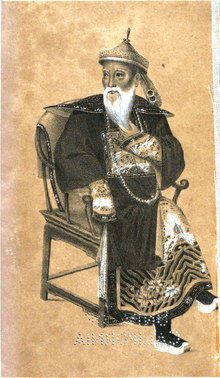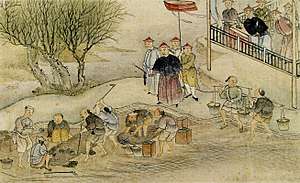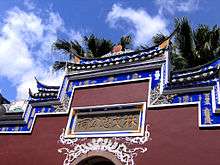Lin Zexu
Lin Zexu (30 August 1785 – 22 November 1850), courtesy name Yuanfu, was a Chinese head of states (Viceroy), Governor General, scholar-official under Emperor of the Qing dynasty best known for his role in the First Opium War of 1839–42. He was from Fuzhou, Fujian Province. Lin's forceful opposition to the opium trade was a primary catalyst for the First Opium War. He is praised for his constant position on the "moral high ground" in his fight, but he is also blamed for a rigid approach which failed to account for the domestic and international complexities of the problem.[2] The Daoguang Emperor endorsed the hardline policies advocated by Lin, but then blamed Lin for the resulting disastrous war.[3]
Lin Zexu | |
|---|---|
 An 1843 drawing of Lin | |
| Viceroy of Liangguang | |
| In office 21 January 1840 – 3 October 1840 | |
| Preceded by | Deng Tingzhen |
| Succeeded by | Qishan |
| Viceroy of Shaan-Gan | |
| In office 1845 (acting) | |
| Preceded by | Buyantai |
| Succeeded by | Yang Yizeng (acting) |
| Viceroy of Yun-Gui | |
| In office 1848 | |
| Preceded by | Li Xingyuan (Li Hsing-yüan)[1] |
| Succeeded by | Cheng Yuzai (Ch'eng Yü-tsai)[1] |
| Viceroy of Huguang | |
| In office 1837–1839 | |
| Preceded by | Nergingge |
| Succeeded by | Zhou Tianjue |
| Personal details | |
| Born | 30 August 1785 Houguan County, Fujian, Qing Empire |
| Died | 22 November 1850 (aged 65) Puning County, Guangdong, Qing Empire |
| Education | Jinshi 進士 degree |
| Occupation | Politician |
| Military service | |
| Battles/wars | First Opium War |
| Lin Zexu | |||||||||||||||||||||||||||||||
|---|---|---|---|---|---|---|---|---|---|---|---|---|---|---|---|---|---|---|---|---|---|---|---|---|---|---|---|---|---|---|---|
| Traditional Chinese | 林則徐 | ||||||||||||||||||||||||||||||
| Simplified Chinese | 林则徐 | ||||||||||||||||||||||||||||||
| |||||||||||||||||||||||||||||||
| Courtesy name | |||||||||||||||||||||||||||||||
| Traditional Chinese | 元撫 | ||||||||||||||||||||||||||||||
| Simplified Chinese | 元抚 | ||||||||||||||||||||||||||||||
| |||||||||||||||||||||||||||||||
Early life and career
Lin was born in Houguan (侯官; modern Fuzhou, Fujian Province) towards the end of the Qianlong Emperor's reign. His father, Lin Binri (林賓日), served as an official under the Qing government. He was the second son in the family. As a child, he was already "unusually brilliant".[4] In 1811, he obtained the position of advanced Jinshi (進士) in the imperial examination, and in the same year he gained admission to the Hanlin Academy. He rose rapidly through various grades of provincial service. He opposed the opening of China but felt the need of a better knowledge of foreigners, which drove him to collect material for a geography of the world. He later gave this material to Wei Yuan, who published the Illustrated Treatise on the Maritime Kingdoms in 1843. He became Governor-General of Hunan and Hubei in 1837, where he launched a suppression campaign against the trading of opium.[3]
Campaign to suppress opium
Soon after his arrival in Guangdong Province in the middle of 1839, Lin wrote a memorial to Queen Victoria in the form of an open letter published in Canton, urging her to end the opium trade.[5] He argued that China was providing Britain with valuable commodities such as tea, porcelain, spices and silk, with Britain sending only "poison" in return.[6] He accused the foreigner traders of coveting profit and lacking morality. His memorial expressed a desire that the Queen would act "in accordance with decent feeling" and support his efforts. He wrote:
We find that your country is sixty or seventy thousand li from China. The purpose of your ships in coming to China is to realize a large profit. Since this profit is realized in China and is in fact taken away from the Chinese people, how can foreigners return injury for the benefit they have received by sending this poison to harm their benefactors?
They may not intend to harm others on purpose, but the fact remains that they are so obsessed with material gain that they have no concern whatever for the harm they can cause to others. Have they no conscience? I have heard that you strictly prohibit opium in your own country, indicating unmistakably that you know how harmful opium is. You do not wish opium to harm your own country, but you choose to bring that harm to other countries such as China. Why?
The products that originate from China are all useful items. They are good for food and other purposes and are easy to sell. Has China produced one item that is harmful to foreign countries? For instance, tea and rhubarb are so important to foreigners' livelihood that they have to consume them every day. Were China to concern herself only with her own advantage without showing any regard for other people's welfare, how could foreigners continue to live?
I have heard that the areas under your direct jurisdiction such as London, Scotland, and Ireland do not produce opium; it is produced instead in your Indian possessions such as Bengal, Madras, Bombay, Patna, and Malwa. In these possessions the English people not only plant opium poppies that stretch from one mountain to another but also open factories to manufacture this terrible drug.
As months accumulate and years pass by, the poison they have produced increases in its wicked intensity, and its repugnant odor reaches as high as the sky. Heaven is furious with anger, and all the gods are moaning with pain! It is hereby suggested that you destroy and plow under all of these opium plants and grow food crops instead, while issuing an order to punish severely anyone who dares to plant opium poppies again.
A murderer of one person is subject to the death sentence; just imagine how many people opium has killed! This is the rationale behind the new law which says that any foreigner who brings opium to China will be sentenced to death by hanging or beheading. Our purpose is to eliminate this poison once and for all and to the benefit of all mankind.
— Lin Zexu, [7]
The letter elicited no response (sources suggest that it was lost in transit),[8] but it was later reprinted in the London Times as a direct appeal to the British public.[9]
An edict from the Daoguang Emperor followed on 18 March,[10] emphasising the serious penalties for opium smuggling that would now apply.

In March 1839, Lin start to take measures that would eliminate the opium trade.[11] He was a formidable bureaucrat known for his competence and high moral standards, with an imperial commission from the Daoguang Emperor to halt the illegal importation of opium by the British.[6][12] He made changes within a matter of months.[6] He arrested more than 1,700 Chinese opium dealers and confiscated over 70,000 opium pipes. He initially attempted to get foreign companies to forfeit their opium stores in exchange for tea, but this ultimately failed. Lin resorted to using force in the western merchants' enclave. A month and a half later, the merchants gave up nearly 1.2 million kg (2.6 million pounds) of opium. Beginning 3 June 1839, 500 workers laboured for 23 days to destroy it, mixing the opium with lime and salt and throwing it into the sea outside of Humen Town. Lin composed an elegy apologising to the gods of the sea for polluting their realm.[13]
Lin and the Daoguang Emperor, comments historian Jonathan Spence, "seemed to have believed that the citizens of Canton and the foreign traders there had simple, childlike natures that would respond to firm guidance and statements of moral principles set out in simple, clear terms." Neither Lin nor the emperor appreciated the depth or changed nature of the problem. They did not see the change in international trade structures, the commitment of the British government to protecting the interests of private traders, and the peril to British traders who would surrender their opium.[3]
Open hostilities between China and Britain started in 1839 in what later would be called the "First Opium War". The immediate effect was that both sides, by the words of Charles Elliot and Lin, banned all trade. Before this, Lin had pressured the Portuguese government of Macau, so the British found themselves without refuge, except for the bare and rocky harbours of Hong Kong.[14] Soon, however, the Chinese forces faced a British naval fleet, which included the East India Company's steam warship Nemesis and improved weapons, and were soon routed.[3]
Exile in Xinjiang
Lin made significant preparation for war against the possible British invasion. The British sailed north to attack Jiangsu and Zhejiang. The governors of these two provinces failed to heed a warning from Lin, however, and were unprepared when the British easily landed and occupied Dinghai.
Lin became a scapegoat for these losses due to court politics. As punishment, he was exiled to the remote Ili region in Xinjiang. His position was then given to Qishan in September 1840.
While in Xinjiang, Lin was the first Chinese scholar to record several aspects of Muslim culture there. In 1850, he noted in a poem that the Muslims in Ili did not worship idols but bowed and prayed to tombs decorated with poles that had the tails of cows and horses attached to them. This was the widespread shamanic practice of erecting a tugh, but this was its first recorded appearance in Chinese writings. He also recorded several Kazakh oral tales, such as one concerning a green goat spirit of the lake whose appearance is a harbinger of hail or rain.[15]
The Qing government ultimately rehabilitated Lin. In 1845, he was appointed Governor-General of Shaan-Gan (Shaanxi-Gansu). In 1847, he became governor-General of Yun-Gui (Yunnan-Guizhou). These posts were less prestigious than his previous position in Canton, thus his career never fully recovered from the failures there.[16]
Death and legacy


Lin died in 1850 while on the way to Guangxi Province, where the Qing government was sending him to help put down the Taiping Rebellion. Though he was originally blamed for causing the First Opium War, Lin's reputation was rehabilitated in the last years of the Qing dynasty, as efforts were made once more to eradicate opium production and trade. He became a symbol of the fight against opium, with his image displayed in parades, and his writings quoted approvingly by anti-opium reformers.[17]
Despite the antagonism between the Chinese and the British at the time, the English sinologist Herbert Giles praised and admired Lin: "He was a fine scholar, a just and merciful official and a true patriot."
Lin's former home, situated in Fuzhou's historic Sanfang-Qixiang ("Three Lanes and Seven Alleys") district, is open to the public. Inside, his work as a government official, including the opium trade and other work where he improved agricultural methods, championed water conservation (including his work to save Fuzhou's West Lake from becoming a rice field) and his campaign against corruption are well documented.
In China, Lin is popularly viewed as a national hero. June 3—the day when Lin confiscated the chests of opium—is unofficially celebrated as Opium Suppression Movement Day in Taiwan, whereas June 26 is recognized as the International Day against Drug Abuse and Illicit Trafficking in honour of Lin's work. Monuments to Lin have been constructed in Chinese communities around the world.[18][19] A statue of Lin stands in Chatham Square in Chinatown, New York City, United States. The base of the statue is inscribed with "Pioneer in the war against drugs" in English and Chinese.[20][21] A wax statue of Lin also appeared in Madame Tussauds wax museum in London.[6]
More recently, Lin has appeared as a character in River of Smoke, the second novel in the Ibis trilogy by Amitav Ghosh, which takes the Opium Wars as its setting to shed new light on a much-repressed history while offering a contemporary critique of globalisation.[22] The novel takes place in 1838–1839, during which time Lin arrived in Canton and tensions escalated between the foreigners and the Chinese officials.
Three films have been made on his role in the Opium Wars such that he is now one of the symbols of modern China's resistance to European imperialism.
His grandson Commodore Lin Taizeng was an officer in the Beiyang Fleet and commanded one of China's two modern battleships purchased from Germany in the 1880s, Zhenyuan, during the First Sino-Japanese War (1894–1895). He committed suicide with an opium overdose after the ship ran aground and had to be abandoned. His descendants are living in Fuzhou, Fujian and surroundings, Jieyang (Puning), Meizhou, Guangdong and surroundings, various places in China and United States.[23]
Lin is also remembered for a couplet he wrote after his exile which reflects his stoic acceptance: "海納百川,有容乃大。壁立千仞,無欲則剛。" ("The sea accepts the waters of a hundred rivers; its tolerance results in its grandeur. The cliff towers to a height of a thousand ren [unit of length roughly equal to a fathom];[24] its lack of desire gives it its resilience.") The first line of the couplet was chosen as the motto for Chinese Wikipedia.
See also
- History of opium in China
- International Day against Drug Abuse and Illicit Trafficking
- 7145 Linzexu
- Prohibition (drugs)
References
Citations
- China Provinces and Administrative Divisions
- Spence (1999), p. 131.
- Spence (1999), pp. 152–158.
- Lee 2005, p. 3.
- Teng & Fairbank 1979, p. 23.
- de Bary & Lufrano 2000, pp. 201–204.
- Lin Wen-chung kung cheng-shu, vol. 2, roll 3.
- Hanes & Sanello 2004, p. 41.
- Hanes & Sanello 2004, p. 41.
- Hanes & Sanello 2004, p. 43.
- Lovell (2011), p. 53.
- Ebrey, Walthall & Palais 2006, p. 379.
- Chang (1964), pp. 173–174.
- Kuo 1973.
- Newby, L.J. (1999), "The Chinese Literary Conquest of Xinjiang", Modern China, 25 (4): 451–474, doi:10.1177/009770049902500403, JSTOR 189447
- On the progress of war, and Lin Zexu's role, see Kuo 1973.
- Madancy 2003, pp. 96–97.
- Lin Zexu Memorial Archived 2016-06-13 at the Wayback Machine
- Lin Zexu Memorial Museum | Ola Macau Travel Guide Archived 2016-03-26 at the Wayback Machine
- David Chen, Chinatown's Fujianese Get a Statue, New York Times, 20 November 1997.
- Kimlau Square Monuments - Lin Ze Xu : NYC Parks
- Long, strange trip: River of Smoke finds globalization's roots in the Opium Wars
- Paine, S.C.M. The Sino-Japanese War of 1894-1895: Perception, Power, and Primacy. 2003, Cambridge University Press, Cambridge, MA, p. 204. ISBN 0-521-61745-6
- A ren (仞) is equivalent to 8 chi (尺). During the Qing dynasty, a chi was roughly 32 cm.
Bibliography
- Chang, Hsin-pao (1964). Commissioner Lin and the Opium War. Cambridge: Harvard University Press.CS1 maint: ref=harv (link)
- de Bary, Wm Theodore; Lufrano, Richard (2000). Sources of Chinese Tradition: From 1600 Through the Twentieth Century. 2. Columbia University Press. ISBN 978-0-231-11271-0.CS1 maint: ref=harv (link)
- Ebrey, Patricia Buckley; Walthall, Anne; Palais, James B. (2006). East Asia: A Cultural, Social, and Political History. Houghton Mifflin Company. ISBN 0-618-13384-4.CS1 maint: ref=harv (link)
- Hanes, William Travis; Sanello, Frank (2004). The Opium Wars: The Addiction of One Empire and the Corruption of Another. Sourcebooks, Inc. ISBN 0-7607-7638-5.CS1 maint: ref=harv (link)
- Kuo, Pin-Chia (1973). A Critical Study of the First Anglo-Chinese War, With Documents. Hyperion Press.CS1 maint: ref=harv (link)
- Lee, Khoon Choy (2005). Pioneers of Modern China: Understanding the Inscrutable Chinese. World Scientific. ISBN 978-981-270-090-2.
- Lovell, Julia (2011). The Opium War: Drugs, Dreams and the Making of Modern China. London: Picador. ISBN 9780330537858.CS1 maint: ref=harv (link)
- Madancy, Joyce A. (2003). The Troublesome Legacy of Commissioner Lin: The Opium Trade and Opium Suppression in Fujian Province, 1820s to 1920s. Harvard University Asia Center. ISBN 9780674012158.CS1 maint: ref=harv (link)
- Spence, Jonathan D. (1999). The Search for Modern China. New York: Norton. ISBN 0393973514.CS1 maint: ref=harv (link)
- Teng, Ssu-yu; Fairbank, John King (1979). China's Response to the West: A Documentary Survey, 1839-1923. Harvard University Press. ISBN 9780674120259.CS1 maint: ref=harv (link)
Further reading
- Brook, Timothy; Wakabayashi, Bob Tadashi (2000). Opium Regimes: China, Britain, and Japan, 1839–1952. University of California Press. ISBN 9780520222366.CS1 maint: ref=harv (link)
- Hummel, Sr., Arthur W. (1943). Eminent Chinese of the Ch'ing period: 1644–1912, Volumes 1–2. Washington: United States Government Publishing Office.CS1 maint: ref=harv (link)
- Peyrefitte, Alain (1992). The Immobile Empire. Alfred A. Knopf.CS1 maint: ref=harv (link)
- Waley, Arthur (1968). The Opium War Through Chinese Eyes. Stanford University Press. ISBN 9780804706117.CS1 maint: ref=harv (link)
- Waley-Cohen, Joanna (2000). The Sextants of Beijing: Global Currents in Chinese History. W. W. Norton & Company. ISBN 9780393320510.CS1 maint: ref=harv (link)
External links
| Wikimedia Commons has media related to: |
- Text of Lin's Letter to Queen Victoria (Alt)
- Lin Zexu Memorial
- Example of Lin Zexu’s calligraphy at the Wayback Machine (archived December 14, 2007)
- "Lin Zexu" Encyclopædia Britannica Online
| Government offices | ||
|---|---|---|
| Preceded by Deng Tingzhen |
Viceroy of Liangguang 1840 |
Succeeded by Qishan |